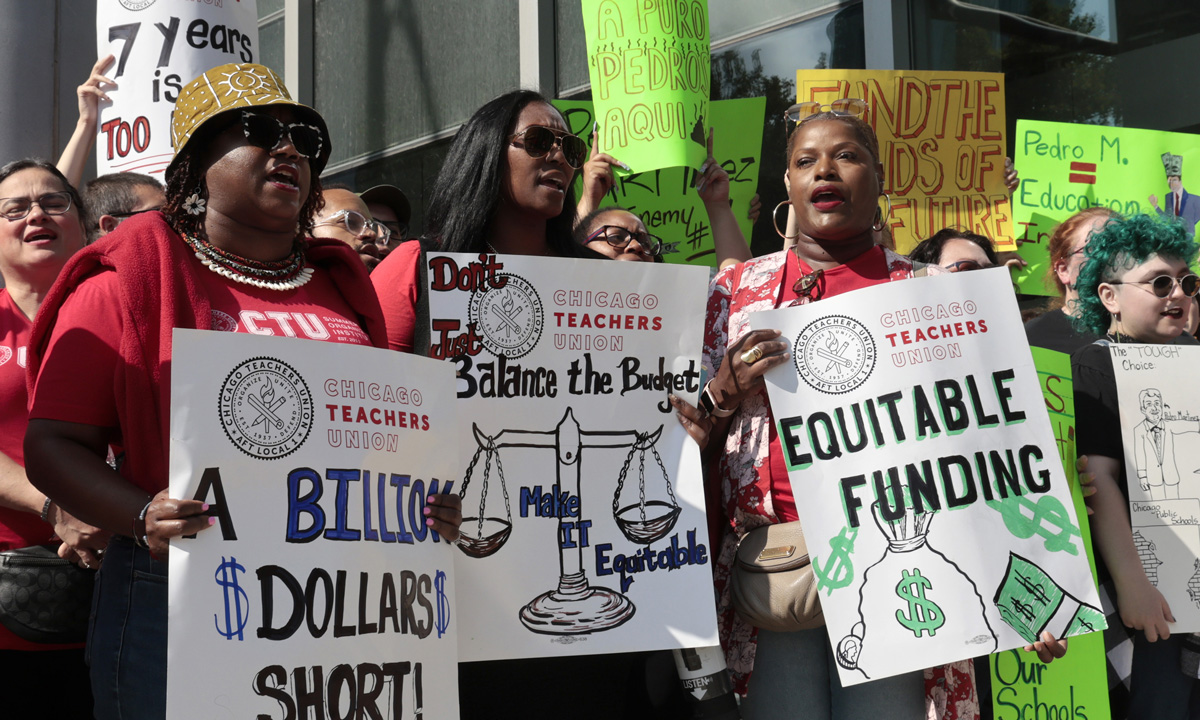$1.5 Billion Chicago Teachers Union Contract Headed to Member Vote
If approved, the deal would hike pay, add staff and decrease class sizes, but questions remain about how the district will afford all four years.

Get stories like this delivered straight to your inbox. Sign up for The 74 Newsletter
Updated: The Chicago Teachers Union announced April 14 that its contract was ratified by a vote of its 27,000 eligible voting members. Of the 85% who cast ballots, 97% voted in favor of the agreement.
Members of the Chicago Teachers Union House of Delegates voted to approve a tentative contract Wednesday, the first time the union has negotiated an agreement without a strike vote in more than 15 years.
The deal will be sent for ratification next week to 30,000 union educators. If the rank-and-file members approve the contract, final vote from the Chicago Board of Education will still be needed.
In-person paper ballot voting will take place April 10 and 11, with results expected to be announced April 14.
“This document gives our educators, our paraprofessionals, our clinicians, an opportunity to be co-producers of a better school day in Chicago, a better staff day in Chicago,” Union President Stacy Davis Gates said at a press conference Tuesday. “That is for the impact of our students.”
The contract grants teachers a 4% retroactive raise for the current school year and4% to 5% salary increases for each of the next three years. Other provisions include smaller class sizes for all grade levels, hundreds of more positions like librarians and social workers, increased teacher preparation time and raises for veteran educators.
Elementary school teachers would get 70 minutes of daily preparation time, up from an hour. Veteran teachers with more than 14 years of experience would receive additional pay bumps, adding up to a $30 million price tag.
If the agreement is approved, Chicago teachers will be among the highest-paid in the nation, with an average $110,000 salary by the end of the contract. The base pay for new teachers would start at $64,470 for the 2024-25 school year and increase to $72,520 by 2027-28.
The deal is less expensive than the union’s original list of demands, such as minimum 9% annual raises, but district officials estimate the current version will cost up to $1.5 billion over the life of the four-year contract. While the district has said it can cover the first year, questions remain about how it will afford payments in future years amid a half-billion-dollar budget deficit.
Last year, district CEO Pedro Martinez and Mayor Brandon Johnson clashed over how to pay for the upcoming agreement as federal COVID aid was about to expire. The conflict led to the October resignation of the entire school board, which had been appointed by Johnson, and the firing of Martinez in December.
Davis Gates said Tuesday that district leaders confirmed they can afford the contract. She said the city council and the mayor’s office believe that surplus tax revenue should go to the district to help fund the deal.
“We think that we have a good coalition of partners that will help us win the necessary funding. This has really been an interesting negotiation where we don’t have people screaming that they cannot pay for it,” Davis Gates said.
When asked how the district plans to pay for the deal, Johnson told WBEZ Chicago, “We’ll do it. Just like I came in and I had a half-billion-dollar deficit in my first budget, had a $1 billion deficit in the second budget. We rectified that. We are leading in this moment.”
Teachers and parents at Tuesday’s press conference pointed to contract changes beyond the pay hike as major wins.
The agreement would double the number of libraries, librarians and bilingual support staff in the district. It would create 215 more special education case manager positions and increase the number of social workers and nurses.
Emmy Ayala, a Chicago Public Schools parent, said her child’s elementary school has a library but no librarian.
“Because of the agreement, this will allow more children to develop a love for reading, a love for learning, and [there will be] a third space in their communities to learn and engage and be safe again,” she said.
Union officials said academic freedom, including teaching Black history, would also be protected for the first time.
“This tentative agreement makes sure that not only do we provide an education to students that is culturally relevant, but that we also embrace their language, their culture, their identities and everything about them,” said Diane Castro, a preschool teacher and bargaining team member. “We will not reduce them.”
Get stories like these delivered straight to your inbox. Sign up for The 74 Newsletter

;)
